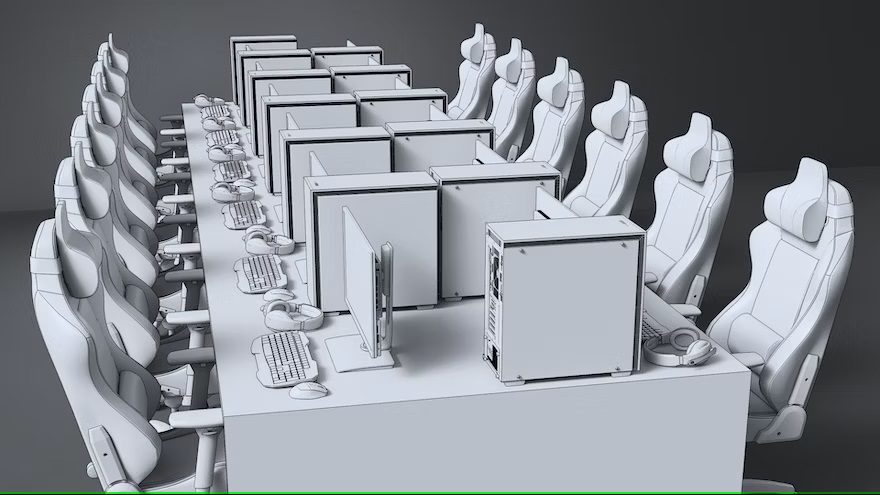By Scott Schroeder, Director of Visualization, Associate, Perkins&Will
Esports has witnessed remarkable growth in recent years, evolving into a mainstream global phenomenon and becoming a lucrative industry. However, access to reliable high-speed internet remains a challenge, particularly in rural areas.
At Perkins&Will, we are exploring the importance of high-speed rural internet in relation to esports, emphasizing the crucial role of community centers in closing the connectivity divide, promoting inclusivity and nurturing local talent.
 Rendering of multi-use esports space within a recreation facility
Rendering of multi-use esports space within a recreation facility
High-speed internet in today's infrastructure
Fast and reliable internet connectivity is the backbone of any successful esports endeavor. In rural areas, where the digital infrastructure is often limited, access to high-speed internet can be a major hurdle for aspiring gamers and esports enthusiasts. While internet penetration in the United States to rural areas has gotten better in the last few years, we are still behind other developed countries in terms of internet availability, speed and cost. Telecom companies have been reluctant to provide high-speed internet in rural areas due to higher costs and fewer subscribers. However, as most of us discovered during the pandemic, reliable, high-speed internet is critical in today’s infrastructure. With the latest legislation, the goal of achieving universal broadband internet access by 2030 becomes even more attainable, as the allocated funds for this are expected to be significantly higher in states with sizable rural populations.
High-speed rural internet is crucial for several reasons. It promotes inclusivity by offering aspiring esports players in rural areas the same opportunities as urban players. It enables rural communities to participate in online tournaments, fostering competition and a sense of community among gamers. It also drives economic growth in rural areas through streaming, content creation and esports-related businesses. Affordability remains a challenge for many rural households though, which is why the development of esports labs in community centers can address this issue by providing not only high-speed internet but also powerful gaming computers, benefiting the entire community.
 Linear configuration model
Linear configuration model
Bridging the digital divide through community
Community centers serve as vital catalysts in bridging the digital divide for rural communities. These centers act as vibrant hubs for education, skill development and social engagement, making them ideal settings to introduce the world of esports. By offering cutting-edge internet infrastructure, these communities gain the opportunity to host esports tournaments, workshops and training sessions, empowering aspiring gamers and casual players to explore the diverse realm of esports.
Esports labs extend beyond gaming, though. They cultivate talent in fields such as coding, video game development, voice acting, writing, broadcasting, journalism, esports medicine, coaching, team ownership and much more. The vast array of esports careers accessible to individuals of all backgrounds highlights why esports needs to be seen as more than just children playing video games. Community centers can also partner with local educational institutions, gaming organizations, and internet service providers to secure funding, technical support and equipment. By leveraging these partnerships, community centers can establish sustainable esports programs that benefit individuals of all ages, from youth to adults.
 Welcoming esport space configuration
Welcoming esport space configuration
As esports continues to gain popularity, the need for high-speed rural internet and community centers becomes increasingly evident. Access to reliable internet connectivity empowers rural communities to participate in the esports ecosystem, fostering inclusivity and driving economic growth. Community centers, as hubs for connectivity and social engagement, play a crucial role in bridging the digital divide by providing access to high-speed internet and organizing esports events. By embracing the potential of esports, rural communities can unleash a new wave of talent, creating opportunities for aspiring gamers and contributing to the vibrant and evolving world of competitive gaming.
For more information on the Perkins&Will Sports, Recreation and Entertainment practice, visit PerkinsWill.com or email [email protected].












